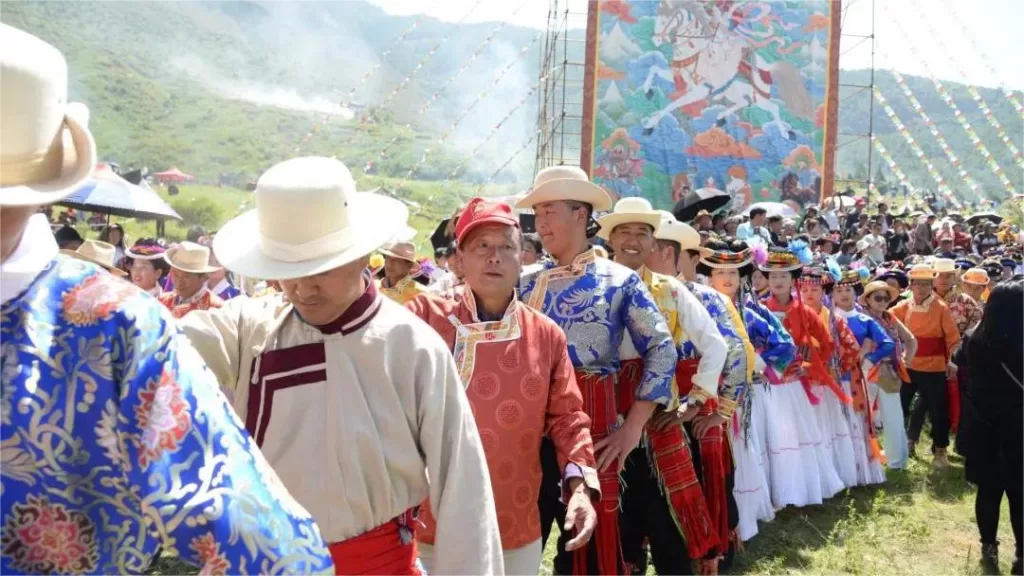The Holy Mountain Festival in Jiuzhai Valley


The Holy Mountain Festival in Jiuzhai Valley is an enchanting and sacred celebration that takes place in one of China’s most breathtaking natural wonders. Located in the Sichuan province, Jiuzhai Valley is a UNESCO World Heritage Site renowned for its stunning landscape, crystal-clear lakes, majestic waterfalls, and colorful forests. The festival is deeply rooted in Tibetan Buddhist traditions and draws pilgrims and tourists alike from all corners of the world. Spanning several days, this cultural extravaganza offers a unique glimpse into the spiritual beliefs and rich heritage of the region.
The festival’s origins can be traced back centuries when Tibetan Buddhism took root in the region, fostering a strong religious and cultural identity among the local communities. The Holy Mountain Festival is traditionally held in the months of late summer, when the valley is painted with vibrant hues of green, red, and gold. Exact dates may vary each year, as the festival follows the Tibetan lunar calendar.
The centerpiece of the Holy Mountain Festival is Mount Jiuquan, a majestic peak that towers over the valley and is believed to be the abode of gods and deities. It is said that during the festival, the veil between the mortal realm and the spiritual world becomes thin, allowing pilgrims to communicate with divine beings and seek blessings. The festival’s religious rituals, prayers, and offerings are deeply meaningful, reflecting the profound spiritual connection between the people and the land.
The festivities begin with a colorful procession of monks, lamas, and devotees, clad in traditional Tibetan attire, as they make their way through the valley, carrying sacred scriptures, relics, and statues of Buddha. Chanting mantras and playing traditional musical instruments, the procession creates an ethereal ambiance that resonates with the breathtaking surroundings.
Throughout the festival, temples and monasteries in Jiuzhai Valley are adorned with exquisite decorations and intricate thangkas (scroll paintings) depicting Buddhist tales and legends. These vibrant artworks serve as a visual feast for visitors, immersing them in the tales of compassion, wisdom, and enlightenment passed down through generations.
The Holy Mountain Festival is not only a spiritual journey but also an occasion for cultural performances and festivities. Traditional Tibetan dances, dramas, and folk songs are performed by local artists, showcasing the rich artistic heritage of the region. These performances not only entertain but also convey moral lessons and spiritual teachings.
Moreover, the festival provides an opportunity for local artisans to display and sell their handicrafts, such as intricately woven carpets, delicate thangkas, and colorful prayer flags. Visitors can indulge in traditional Tibetan cuisine, savoring the unique flavors of butter tea, yak meat dishes, and momos (dumplings).
The Holy Mountain Festival in Jiuzhai Valley is not just a celebration but a unifying force that brings together people from diverse backgrounds and beliefs. It fosters a sense of community and shared spirituality, encouraging respect and understanding among all who attend.
However, with the increasing popularity of the festival, there are concerns about preserving its authenticity and ecological balance. Authorities and local communities are working to ensure that the festival’s growth remains sustainable, with measures to protect the delicate environment and promote responsible tourism.
In conclusion, the Holy Mountain Festival in Jiuzhai Valley is a mesmerizing blend of nature’s beauty, spirituality, and cultural richness. It offers an unforgettable experience for both pilgrims and tourists, leaving them with a deep appreciation for the profound connections between humanity, divinity, and the natural world. As the sun sets over the majestic peaks and the last notes of traditional music fade away, visitors depart with cherished memories and a renewed sense of wonder about the sacred lands of Jiuzhai Valley.
Jiuzhai Valley National Park facts